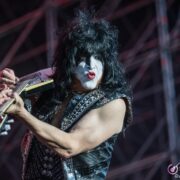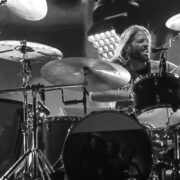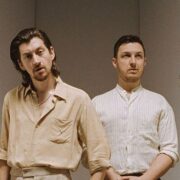Dopo il loro grande successo all’Eurovision Song Contest 2021, i Blind Channel non si sono fermati un attimo: due anni di tour, partecipazioni a festival importanti, un quarto album nel 2022 e, lo scorso maggio, anche un nuovo singolo. Abbiamo incontrato i due vocalist della band, Joel Hokka e Niko Vilhelm Moilanen, per parlare dell’ascesa del gruppo a dieci anni di distanza dalla sua formazione: dagli esordi nei primi festival finlandesi a oggi, poche ore prima di aprire per gli Iron Maiden al The Return Of The Gods Festival di Milano.
— SCROLL DOWN FOR THE ENGLISH VERSION —
Ciao e benvenuti su SpazioRock! Come state?
Joel: benissimo!
Niko: alla grande, grazie mille! Siamo felici di essere tornati in Italia.
Era da un anno che non tornavate qui, se non erro.
Niko: sì, circa un anno.
Joel: sì, non venivamo qui dallo scorso settembre.
Una domanda banale, ma necessaria: siete in procinto di suonare al The Return Of The Gods Festival a Milano, prima di Epica, Stratovarius e Iron Maiden. Lineup interessante, che ne dite?
Niko: già, credo che qui noi siamo un po’ “quelli strani”. Cioè, le altre band non hanno un DJ o un rapper, quindi penso che in questa lineup siamo i “pesci fuor d’acqua”, hai presente? Però sarà divertente.
Come vi sentite? Entusiasti? In ansia?
Joel: abbiamo fatto così tanti concerti in questo periodo – credo quasi 60 o 70 – che siamo abituati a suonare, non è più una novità.
Posso solo immaginare!
Niko: già. Abbiamo anche fatto set di durate diverse: sessanta, settantacinque, quarantacinque minuti… credo che stasera siano tipo trenta minuti?
Joel: sì.
Niko: quindi per noi si tratta soprattutto di divertirci. Non c’è bisogno di dosare i propri sforzi più di tanto quando si suona solo per 30 minuti, quindi credo che ci sarà molta energia. Ci divertiremo un sacco!
Vi definite “i Backstreet Boys della scena metal”, un epiteto parecchio divertente. Come mai avete deciso di descrivere così il vostro sound?
Joel: è iniziato come uno scherzo, quando facevamo i nostri primi concerti in Finlandia.
Niko: credo che più che uno scherzo fosse un insulto, più o meno intorno al 2014. Suonavamo ai nostri primi festival – ovviamente, festival metal – e, come ho detto prima, siamo abituati a essere quelli strani, i pesci fuor d’acqua: gli altri gruppi erano classiche band metal, ma noi avevamo elementi di musica elettronica e rap, e persino delle coreografie che facevamo ai tempi (e che facciamo ancora, fino a un certo punto). Credo che fosse un insulto nei nostri confronti da parte dei fan del metal classico fra il pubblico, che dicevano: “Questo non è metal, questi devono essere i Backstreet Boys”. Così poi noi abbiamo contribuito alla cosa, come per dire “Certo che lo siamo!”.
È un ottimo modo per trasformare un insulto in un complimento, in effetti.
Niko: già (ride, ndr).
Il fattore “moderno” è sicuramente percepibile, nell’ascoltare la vostra musica — è roba su cui fare headbanging, ma è anche molto orecchiabile. Non a caso il vostro terzo album si chiama “Violent Pop”: una dichiarazione di intenti, oserei dire…
Niko: sì, decisamente. “Violent Pop” è nato un po’ prima della storia dei Backstreet Boys. Questa storia in realtà è piuttosto noiosa: stavamo inviando le nostre demo alle radio locali, volevano che descrivessimo la nostra musica e noi non volevamo scrivere nulla di troppo lungo, perché nessuno l’avrebbe letto. Inoltre, non volevamo dire “nu metal”, perché non era di moda quando abbiamo iniziato: l’ondata era appena passata, quindi se ci fossimo definiti “nu metal” saremmo sembrati in ritardo rispetto a quel periodo. E poi, “alternative rock” è il modo più noioso possibile per descrivere la tua musica (ride, ndr). Quindi volevamo qualcosa di facile da capire e di molto accattivante, così ci è venuto in mente “pop violento” e da allora chiamiamo così la nostra musica.
Joel: e penso che “i Backstreet Boys della scena metal” e “pop violento” siano più o meno sinonimi, perciò è praticamente la stessa cosa.
Sempre in quel periodo, vi siete fatti notare da molti italiani perché avete rappresentato la Finlandia all’Eurovision 2021 — lo stesso anno in cui l’Italia era rappresentata dai Måneskin. All’epoca pensai che il successo di entrambe le rock band in gara fosse significativo per questo genere, in termini di popolarità: ripensandoci, voi che ne direste?
Joel: indubbiamente. Penso che sia stato nella prima ondata del post-covid che la gente ha iniziato a pensare che potessero tornare gli eventi dal vivo, e la sensazione di “rock’n’roll” che avevamo noi e i Måneskin, usciti dagli anni del covid, sembrava qualcosa di super fresco. Prima del covid c’erano un sacco di artisti rap, quindi nuovi gruppi rock, in cui suonano giovani che partecipano a un importante concorso televisivo e vanno in tour in tutto il mondo… sembrava che in quel preciso momento stesse accadendo qualcosa di inedito. E credo che questo sia stato il motivo per cui alla gente è sembrata una novità, sebbene la musica rock fosse stata al suo apice solo negli anni 2000. Ma ora sembra che…
Niko: per un po’ fosse sparita.
Joel: sì, esatto. E il nu metal, come i Linkin Park, è tornato a essere una cosa importante dopo vent’anni, e ci sono un sacco di nuovi gruppi, e Machine Gun Kelly sta facendo grandi cose, e anche i Måneskin, e Yungblud… quindi credo che quello sia stato un po’ l’inizio di un’ondata di rock più grande in Europa.
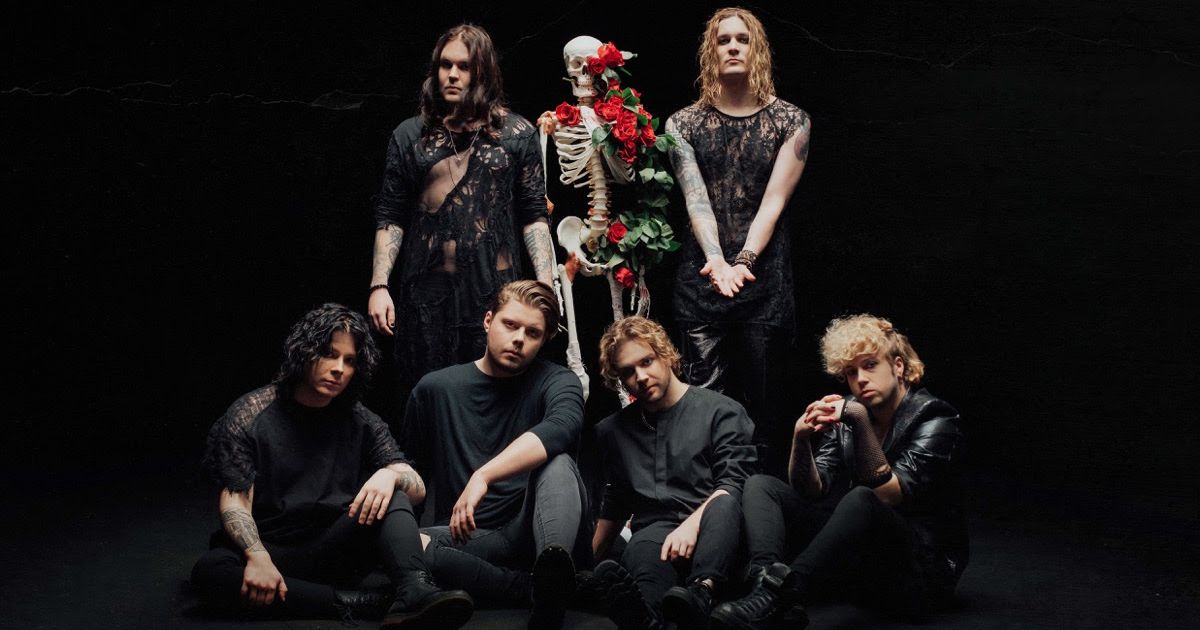
È sembrato particolarmente inedito, in un contesto così allegro e poppeggiante, sentire parole come “put your middle fingers up” e riferimenti al club dei 27 — lì per lì potrebbero aver suscitato qualche perplessità, ma in fin dei conti “alzare un dito medio” è, si spera, ciò per cui è tuttora fatto il rock…
Joel: sì, esatto, avrei dovuto dirlo. Erano tempi bui, durante il covid, e forse la gente — ovviamente ci saranno sempre canzoni sull’amore e la felicità è tutto il resto, ma penso che all’epoca la gente avesse bisogno di qualcosa di ribelle. Dato che erano tempi bui, forse la gente aveva voglia di fare casino e alzare il dito medio — fare un po’ di scena, insomma. Credo che fosse ciò di cui le persone avevano bisogno e perlomeno ciò di cui avevamo bisogno noi.
Perciò è anche quello di cui ha bisogno il rock come genere?
Niko: è un atteggiamento, più che un genere.
Joel: sì, esatto.
Un verso del vostro brano dell’Eurovision, “Dark Side”, è poi diventato il titolo del vostro ultimo album, “Lifestyles Of The Sick & Dangerous”, che è un omaggio a “Lifestyles of the Rich & Famous” dei Good Charlotte.
Joel: sì!
Niko: già (ride, ndr).
Cos’è che amate così tanto del rock anni Duemila — e cosa ne pensate del suo recente ritorno nel mainstream?
Joel: siamo cresciuti in quel periodo musicale: come ho detto prima, siamo cresciuti nell’era del nu metal e c’erano anche i Good Charlotte e tutta quella roba che amiamo ancora.
Niko: non possiamo fare a meno di amarla! (ride, ndr)
Joel: anche il nome della band, Blind Channel, deriva da quella guida di MTV di… beh, 10 anni fa o giù di lì: pensammo che “ora è un canale cieco”, perché non era più un canale TV. Perché amavamo molta musica, video e band che trovavamo in televisione, quindi credo che sia nel nostro DNA amare tutto il rock degli anni Duemila e siamo felici e fortunati che adesso stia esplodendo, perché siamo in cima alle classifiche europee!
Niko: non era così quando abbiamo iniziato.
Joel: era tutto EDM e Avicii e house svedese — e amiamo anche questi generi, ma all’epoca non c’era posto per il rock.
Quindi sta davvero tornando nel mainstream.
Niko: sì. Se parliamo di MTV, per noi la fine dei video musicali è stata come la fine dell’infanzia, ed è appunto da qui che deriva il nome Blind Channel.
Tornando al presente, avete pubblicato un nuovo singolo, “Happy Doomsday”, che sembra una critica ironica al panico morale — “quando la fine del mondo è una notizia di ieri”. Pensate che, dita medie a parte, la musica abbia ancora il dovere di essere semplicemente divertente?
Niko: mi piace questa domanda. Posso parlare solo per noi, ma penso che la musica debba essere in grado di intrattenere e di esistere solo per intrattenimento. Ora come ora è sempre stato così: ci sono questi grandi artisti che scrivono canzoni allo scopo di fare un grande cambiamento, sai, in senso politico. Noi non l’abbiamo mai fatto, e il motivo è che semplicemente non sappiamo abbastanza di ciò che sta accadendo nel mondo per poterne parlare in modo efficace, capisci cosa intendo? Quindi ci siamo concentrati maggiormente sulla sofferenza individuale delle persone e sul, come dire, “salvare le persone una canzone alla volta”. Se la canzone è significativa per una sola persona, allora è valsa la pena scriverla.
È davvero un bel concetto.
Niko: sì. È così che ci sentiamo e “Happy Doomsday” parlava soprattutto delle nostre sensazioni su tutto ciò che sta succedendo: non solo il covid, ma anche tutto quello che è successo dopo. Ci sembra che ogni giorno sia la cazzo di fine del mondo, quindi sì, questa è solo una canzone ironica e festaiola.
Capisco. Ultima cosa, di recente siete stati in tour con i Lacuna Coil e al momento siete coinvolti in una serie di interessanti lineup in giro per l’Europa. Come sta andando la stagione dei festival? C’è qualche concerto in particolare che vi è piaciuto particolarmente in passato o che non vedete l’ora di fare?
Joel: beh, negli ultimi due anni in generale abbiamo suonato quasi duecento concerti, quindi è come se fossimo sulle montagne russe, diretti da qualche parte proprio ora senza vedere la fine della corsa. Ci sono molti momenti salienti, forse troppi – come il Download Festival nel Regno Unito e il Resurrection Festival in Spagna, dove abbiamo suonato sul palco principale –, ce ne sono a bizzeffe. E siamo stati in tour con band come gli Electric Callboy, che sono più che altro nostri amici…
Siete stati in Italia con loro, l’anno scorso.
Niko: sì!
Joel: sì, abbiamo fatto da headliner in quello stesso locale, lo scorso settembre. In realtà torneremo in Italia l’anno prossimo in un locale più grande a Milano, ma non possiamo ancora dirti nulla.
Niko: sarà una grande serata, e credo che ci saranno molti fan lì. È pazzesco e non capisco come sia successo. Credo che i Måneskin siano stati una delle motivazioni.
Joel: sì, ci hanno aiutati molto.
Questa era l’ultima domanda! Grazie mille per il vostro tempo.
Niko: grazie mille!
Joel: grazie!
— ENGLISH VERSION —
Hello and welcome to SpazioRock! How are you doing?
Joel: Great!
Niko: Great, thank you so much! Happy to be back in Italy.
You hadn’t been here for a year, if I’m not mistaken.
Niko: Yeah, about a year.
Joel: Yeah, we hadn’t been here since last September.
A trivial question, but a needed one. Right now, you guys are about to be playing at The Return Of The Gods Festival in Milan, right before Epica, Stratovarius, and Iron Maiden. It is an interesting lineup, isn’t it?
Niko: yeah, yeah, I think we’re pretty much the oddball here. Like, I don’t see the other bands, like, they don’t have a DJ or a rapper, so I think in this lineup we are the “odd fish”, if you know what I mean? But it’s gonna be fun.
How are you feeling? Excited, anxious?…
Joel: well, we’ve been playing so many shows this yeah – I think almost 60 or 70 – so we’re used to playing shows, it’s nothing new anymore.
I can only imagine!
Niko: yeah, and lots of different lengths, sets — like, 60, 75, 45 minutes… I think tonight it’s like, 30 minutes?
Joel: yeah.
Niko: so it’s mostly just about having fun for us. Like, you don’t need to pace yourself that much where you’re only playing for 30 minutes, so I think there’s gonna be a lot of energy. We’re gonna be having a lot of fun!
You describe yourselves as “the Backstreet Boys of the metal scene” — quite the funny title, in a good way. Why did you choose it to define your sound?
Joel: it started with a joke, when we used to play our first shows in Finland.
Niko: I think more than a joke it was like an insult, back in 2014 or something like that. We played our first festivals – obviously, metal festivals – and as I said before, we’re used to being the oddball, the oddfish: the lineup and the other bands were these classical metal bands, but we had elements from electronic music and from rap music, we had rapping and all of that, and even choreographies that we used to do back in the day (and still do, at some point). So I think it was meant to be an insult at us from these classic metal fans in the audience — they were like, “This is no metal, this gotta be, like, the Backstreet Boys”. And then we kinda added up to it later, like, “Damn right we are!”.
That’s a great way to turn an insult into a compliment, actually…
Niko: Yeah (laughs).
The “modern” element is definitely there when listening to your music, though — it’s headbanging material, but there’s also a “catchy” element to it. It’s not without reason that your third album is called “Violent Pop”: it seems like a “declaration of intents”, dare I say?…
Niko: Yeah, definitely. “Violent Pop” came a bit before the Backstreet Boys thing. The story is actually pretty boring — it’s just like, we were sending our demos to local radio stations, they wanted us to describe our music and we didn’t wanna write anything too big ‘cause no one would read it. And also, we didn’t want to say “nu metal”, because that wasn’t a thing when we started: the wave had just passed, so if we called it “nu metal” it felt like we were late from the wave. And then, like, “alternative rock” is the most boring way to describe your music (laughs). So we wanted something that’s easy to understand and very catchy, so we came up with “Violent Pop” and we’ve been calling our music “Violent Pop” ever since.
Joel: and I think it’s kinda like, “the Backstreet Boys of the metal scene” and “Violent Pop” are kinda synonyms, so it’s pretty much the same thing.
Around that period, many people in Italy became aware of you because you represented Finland at Eurovision 2021 — the same year Måneskin were representing us. Back then, I thought that both rock bands having such a great success meant a lot for the rock scene in terms of popularity. Looking back on it, do you think so?
Joel: definitely. I think it was in the first wave of the post-covid that people started to feel that there could be live events, and the “rock’n’roll” feeling that Måneskin and us had felt like something super fresh out of the covid years. Before covid there was like, a lot of rap artists, so the brand new rock bands that are played by young people and they’re been, like, playing in this huge TV competition and going on tour around the world… it felt like there was something brand new happening right now. And I guess that was the reason why it felt so refreshing for people, even though rock music had just been in its peak in the 2000s, but right now it feels like…
Niko: it went away for awhile.
Joel: yeah, yeah. And like, nu metal like Linkin Park it’s once again a big deal after, like, 20 years, and there are a lot of new bands, and Machine Gun Kelly is doing great things, and Måneskin as well, and Yungblud… so I guess that was kinda like the start of a bigger rock wave in Europe.
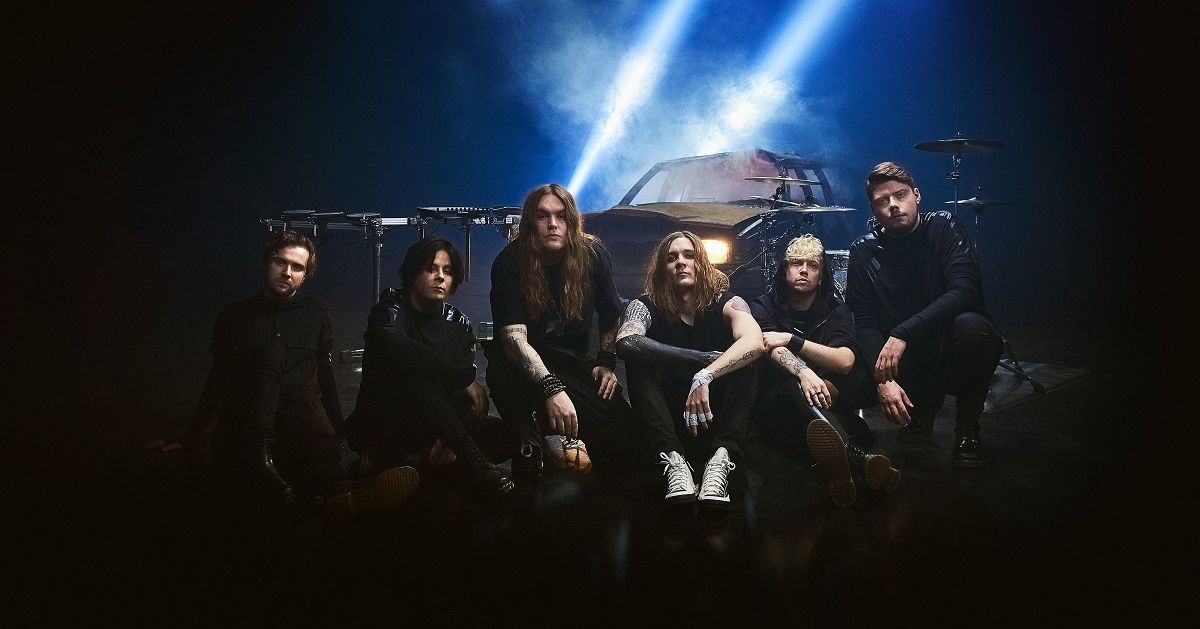
It felt especially refreshing, in such a poppy, happy-go-lucky context, hearing words such as “put your middle fingers up” and 27 club nods — it may have raised some eyebrows there, but at the end of the day “putting middle fingers up” is hopefully what rock is still made for…
Joel: yeah, exactly, I was supposed to say that. Those were dark times, like, during covid, and maybe people — of course there always will be songs about love and happiness and all of that, but I also think people needed something rebellious. Since those were dark times, maybe people felt like fucking shit up and throwing middle fingers up — like, acting out a bit. And I think that’s also, like, that’s what people needed at the time and that’s what we needed at least.
So is it also what rock needs as a genre?
Niko: it’s an attitude, more than a genre.
Joel: yeah, right.
A lyric of your Eurovision song, “Dark Side”, then became the title of your last album, “Lifestyles of the Sick & Dangerous”, which is an homage to Good Charlotte’s “Lifestyles of the Rich & Famous”.
Joel: yes!
Niko: yeah (laughs).
What is it about the 2000s rock that you love so much — and what do you think of its recent comeback in the mainstream sense?
Joel: we’ve grown up in that era of music — as I said before, we’ve grown up in that whole nu metal era, and there was also Good Charlotte and all that stuff that we still love.
Niko: we can’t help it! (laughs)
Joel: also the band’s name, Blind Channel, comes from that MTV guide back in… well, 10 years ago or so — we felt that “now it’s a blind channel”, as it was not a channel anymore. Because we used to love a lot of music and videos and bands that we found from TV, so I guess it’s in our DNA that we love all of that 2000s rock and we’re happy and lucky that now it’s popping, because we’re on the top of the way in Europe!
Niko: that wasn’t the case when we started.
Joel: it was just EDM and Avicii and Swedish house — and we love them as well, but there was no place for rock in that period.
It really is coming back in the mainstream.
Niko: yeah. If you talk about MTV, the end of music videos was like the end of childhood for us, and that’s were the Blind Channel name comes from.
Back to the present, you released a new single, “Happy Doomsday”, which feels like a tongue-in-cheek commentary on moral panic — “when the end of the world is yesterday’s news”. Do you think that, all middle fingers aside, music still has the duty to be simply entertaining?
Niko: I like the question. We’re not trying to — I can only speak for our music, but I think music should be able to be only entertaining and only for entertainment purposes. Right now it’s always been this way, that these big artists, like, they do these songs that are meant to make some kind of big change, you know, in a political way. We’ve never done that, and the reason is that we simply don’t know enough about what’s happening in the world that we could, like, do it in a way that would be effective, if you know what I’m saying? So we’ve been concentrating more on the individual suffering of people and, you know, “saving people one song at a time”. If the song is meaningful for one person, then the song was worth making.
That’s a great concept.
Niko: yeah. That’s how we feel, and “Happy Doomsday” was mostly about our feelings on everything like, not only covid, but everything that happened afterwards, and it feels like every day is the new fucking end of the world, so yeah, it’s just an ironic party song.
I understand. Lastly, you’ve recently gone on tour with Lacuna Coil and you’re currently involved in a series of interesting lineups all around Europe. How’s the festival season going? Is there any particular gig that you particularly loved in the past or that you’re looking forward to?
Joel: well, in the last two years in general we played almost 200 shows, so it’s been like, you went through the rollercoaster and it’s going somewhere right now and we don’t see the end of the ride. There are a lot of highlights, maybe too many – like Download Festival in the UK and Resurrection festival in Spain, we’ve played the main stage – and there’s tons of that. And we’ve been touring with bands like Electric Callboy, who are more like our friends…
You’ve been in Italy with them last year.
Niko: yeah!
Joel: yeah, we headlined that same venue last September. Actually, we’re coming back in Italy next year in an even bigger venue in Milan, but we can’t tell you anything yet.
Niko: it will be a big one, and I believe that we’ve got a lot of fans there. It’s crazy, and I don’t see how that happened. I guess Måneskin was one of the reasons why.
Joel: yeah, helped us a lot.
Alright, this was the last question! Thank you so much for your time.
Niko: thank you so much!
Joel: thank you!

